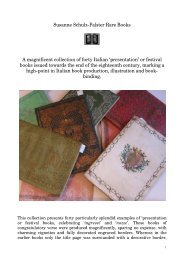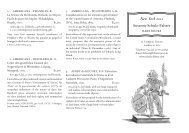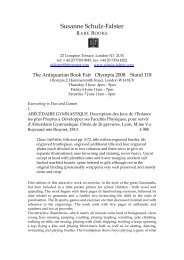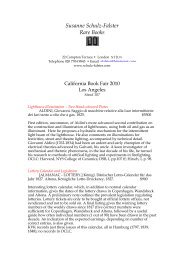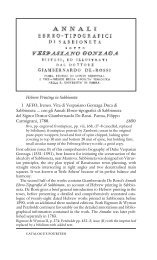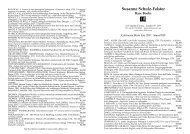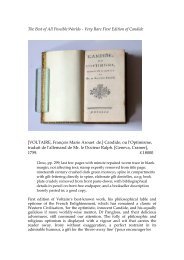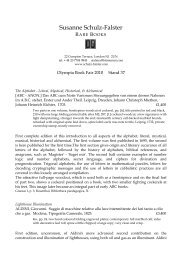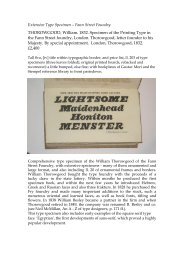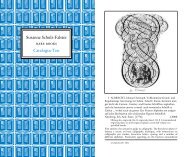Catalogue Number 12 - Susanne Schulz-Falster
Catalogue Number 12 - Susanne Schulz-Falster
Catalogue Number 12 - Susanne Schulz-Falster
You also want an ePaper? Increase the reach of your titles
YUMPU automatically turns print PDFs into web optimized ePapers that Google loves.
Contracts in Commercial Law<br />
35 GHIO, Giuseppe. Della Clausula all’Ordine o sia all’Ordine<br />
S.P. Adoprata nelle Cambiali e del suo vero SigniWcato. Pisa,<br />
Carotti, 1772. £480<br />
4to, pp. 75; title vignette, elaborate illustrated initials; uncut in the original<br />
buV stiV wrappers; wrapper with some dust-soiling, else a Wne copy,<br />
with ownership inscription of Tommaso del Santo to inside front<br />
wrapper.<br />
First edition of an interesting treatise on commercial law. Ghio, a lawyer by<br />
profession, discusses diVerent types of contract in bills of exchange and<br />
letters of credit. He discusses the minutiae of Wnancial transactions and<br />
banking procedure, and especially concentrates on the diVerence between<br />
money transfers being agreed under speciWc terms, either payment<br />
‘all’ordine’ or payment ‘all’ordine S.P ’ (senza procura). He apparently also<br />
treats triangular contracts where the debtor does not pay the lender directly,<br />
but clears his debts by transferring the debt. He also discusses guaranteed<br />
loans, and their legal provisions.<br />
A second edition was published in 1787.<br />
Goldsmiths’–Kress 10921.4.<br />
Enlightenment Reforms in Tuscany<br />
36 GIANNI, Francesco Maria. Governo della Toscana sotto il<br />
Regno di sua Maestà il Re Leopoldo II. Firenze, Gaetano Cambiagi<br />
Stampatore Reale, 1790. £1500<br />
Tall 4to, pp. [iv] including Wrst blank, 76, 60 unnumbered leaves and 4<br />
folding sheets, tables A–DD, dimostrazione I–V; bound in contemporary<br />
vellum-backed pattern paper boards; a very crisp Wne copy,<br />
printed on strong paper.<br />
First edition of Gianni’s account of the economic reforms carried out during<br />
Leopold II’s rule as grand duke of Tuscany, before he became emperor<br />
of the Austro-Hungarian Empire in 1790. Leopold II was one of the most<br />
capable and remarkable of the reforming princes of the eighteenth century.<br />
Advised by the liberal economist Bandini, he introduced a system of free<br />
trade in grain and foodstuVs, promoted agriculture, and reclaimed<br />
marshlands for intensive cultivation. Taxation was reformed on the basis of<br />
equality for all citizens, which abolished the privileges of the nobility. Local<br />
government and the administration of justice were also revised, and torture<br />
and capital punishment abolished.<br />
Written by the economist and administrator Gianni (1728–1821) in<br />
close collaboration with Leopold II, this account was clearly modelled on<br />
Necker’s famous Compte Rendu. Gianni gives a detailed, and Wrst-hand report<br />
of these economic reforms, which in the Wrst part are described in great<br />
detail, with clear reference to the legislation passed and new rules introduced.<br />
In the second section the achievements are presented in detailed ac-<br />
susanne schulz-falster rare books catalogue twelve<br />
count form, presenting the ‘end-of-year’ accounts of Leopold’s last year in<br />
oYce in Tuscany, compared to 1765, the beginning of his reign. In a clear<br />
cost versus result analysis, all aspects of public Wnance are covered, ranging<br />
from the Tuscan tax income, public accounts and the national debt, to local<br />
accounts of cities such as Siena, and state expenditure on speciWc areas, such<br />
as prisons, Wne arts, and public administration. Even the accounts of the<br />
grand duke himself are laid open.<br />
A fascinating document of enlightened administration, which shows an<br />
astonishing degree of openness and accountability of an absolute ruler. The<br />
work was widely distributed through two reprints in 1791 and even translated<br />
into German in 1795.<br />
Cossa 143, 87; Einaudi 2668; Kress Italian 595.<br />
37 GLOBIG, Hans Ernst von & Johann Georg HUSTER.<br />
Abhandlung von der Criminalgesetzgebung. Eine von der<br />
ökonomischen Gesellschaft in Bern gekrönte Preisschrift. Zürich, J.<br />
C. Fuessly, 1783. £650<br />
8vo, pp. [viii], 440, 1 errata; some light browning and spotting, due to<br />
paper quality; contemporary buV boards, gilt-lettered spine label, shelf<br />
label to spine, head and tail of spine a little bumped, else a Wne copy,<br />
with manuscript note to front free endpaper giving purchase<br />
information of 1786, price and binding cost.<br />
First edition of Globig and Huster’s prize winning work on the criminal<br />
justice system, submitted in response to a prize question of the economic<br />
society in Berne, posed in the wake of Beccaria’s De delitti e delle Pene,<br />
Montesquieu, and other expressions of enlightenment reform spirit. The<br />
substantial work is clearly organised. After a brief introduction into criminal<br />
law in general, Globig discusses crime and its appropriate punishment.<br />
Here he gives extensive examples, and maintains that Beccaria ignored the<br />
individuality of crime and its exponents. He discusses individually all manner<br />
of oVences ranging from regicide to insulting oYcials, from Wrst degree<br />
murder to manslaughter, from oVences against property to oVences against<br />
people. Amongst these he individually treats both suicide and abortion.<br />
The second section deals with criminal investigation, evidence, and conclusive<br />
proof. Here Globig deals with witnesses, incriminating evidence, ‘corpus<br />
delicti’. In part three he analyses how criminal procedure should<br />
combine quick but decisive investigation, torture-free interrogation, and a<br />
well organised trial, to result in an exemplary punishment, which guarantees<br />
the safety and security of the public. He describes criminal procedure in<br />
great detail, and in particular insists on both verdicts and punishments being<br />
made and carried out in public, for optimum deterrent eVect.<br />
Globig’s detailed observations, which he had prepared together with his<br />
colleague J. G. Huster, are particularly pertinent, as he was later asked by<br />
Frederic the Great to be involved in the reform of the Prussian penal code.<br />
After a number of political positions the lawyer Globig (1755–1826) be-



